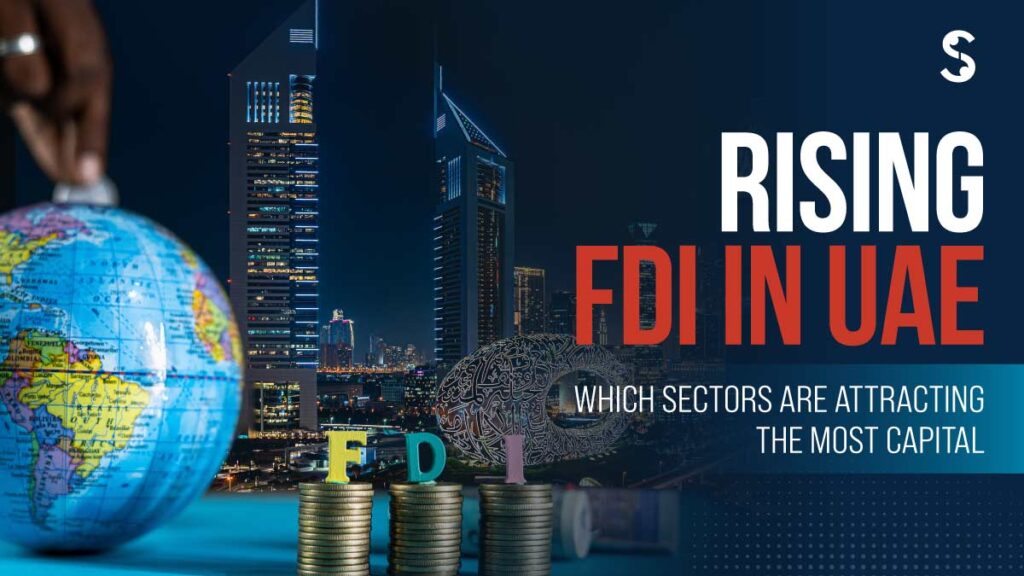In recent years, the UAE attracted AED 167.6 billion (USD 45.6 billion) in foreign direct investment (FDI)—a massive 48% increase from the previous year, ranking 10th globally and securing 37% of all foreign investment flowing into the Middle East. The country also recorded 1,369 new greenfield projects worth AED 53.3 billion (USD 14.5 billion), placing it 2nd worldwide.
With 100% foreign ownership in many sectors, low corporate tax, strong infrastructure, and investor-friendly laws, the UAE, especially Dubai and Abu Dhabi, continues to be a top choice for global investors. In this blog, we explore which sectors are attracting the most capital and why the UAE remains one of the world’s most dynamic investment destinations.
Understanding FDI Growth in UAE
The UAE has become one of the top global hubs for foreign investment, due to its investor-friendly policies and strong economic vision. The government has introduced several reforms to make the business environment open, transparent, and competitive. Tax benefits, simplified company registration, and sector-specific incentives have encouraged investors from all over the world.
A key factor driving this growth is the role of free zones and the allowance of 100% foreign ownership in many sectors. Free zones offer tax exemptions, zero import/export duties, and full profit return, making them especially attractive to international businesses. These policies have helped the UAE position itself as a safe, profitable, and growth-oriented investment destination.
UAE Investment Opportunities by Sector
Top Sectors for FDI in UAE
The UAE has become one of the most attractive destinations for foreign investors, due to its strong economy, business-friendly policies, and prime location. As the country works towards its economic diversification goals under Vision 2031, several sectors are emerging as magnets for international capital.
Real Estate & Infrastructure
The UAE’s booming property market continues to attract global investors, especially in Dubai and Abu Dhabi. Luxury residential projects, commercial complexes, and mega infrastructure developments such as smart cities and transport hubs are key investment drivers.
Renewable Energy
With its commitment to Net Zero by 2050, the UAE is investing heavily in solar, wind, and clean energy projects. The Mohammed bin Rashid Al Maktoum Solar Park is one of the most significant renewable energy initiatives in the world, offering profitable opportunities for FDI.
Technology & Innovation
The UAE is positioning itself as a tech hub through initiatives in AI, blockchain, fintech, and cybersecurity. Free zones like Dubai Internet City and Abu Dhabi’s Hub71 are attracting startups and global tech companies with incentives such as 100% foreign ownership.
Tourism & Hospitality
Dubai’s status as a global tourism hub, combined with mega-events like Expo City projects and growing luxury hospitality investments, keeps this sector in high demand. Investments range from hotels and resorts to theme parks and cultural attractions.
Logistics & Trade
Located at the crossroads of Asia, Europe, and Africa, the UAE is a global logistics powerhouse. Ports like Jebel Ali and airports like Dubai International are continuously expanding, creating opportunities in warehousing, e-commerce fulfilment, and shipping services.
Healthcare & Life Sciences
The demand for high-quality medical services is rising, fueled by a growing population and medical tourism. Investments are flowing into hospitals, research centres, and biotech ventures, supported by government initiatives to make the UAE a healthcare hub.
Government Focus for Economic Diversification
The UAE government is actively channelling foreign investment towards non-oil sectors to reduce dependency on hydrocarbons. Key focus areas include:
- Knowledge-based industries: technology, research, and innovation
- Sustainable development: renewable energy, green construction, and environmental solutions
- Advanced manufacturing: aerospace, automotive, and 3D printing
- Food security: agritech and sustainable farming solutions
By promoting these sectors, the UAE is creating a balanced, future-ready economy that continues to attract long-term global investors.
Most Profitable Industries for FDI in UAE 2026
The most profitable sectors for FDI in the UAE are as follows:
Renewable Energy & Clean Tech
Why: UAE is actively pivoting to green power (big targets for GW-scale capacity), sovereign funds and state-backed groups are deploying capital, and global demand for low-carbon projects supports long-term contracted returns. Mature project pipelines, PPAs and export opportunities (e.g., green hydrogen/exports) make returns attractive for strategic investors.
Main risks: policy/regulatory shifts in off-taker markets, project permitting delays, and commodity/technology cost cycles.
Technology Infrastructure
Why: UAE’s digital economy push, suitability as a regional data hub, and recent focus on semiconductors / advanced manufacturing attract high-value greenfield and brownfield FDI. Data centres and AI/cloud services offer subscription-style revenues and economies of scale. Semiconductors promise strategic premium returns if supply-chain incentives persist.
Main risks: high upfront capex, rapid tech obsolescence, global chip cycle volatility.
Logistics, Ports & Trade Infrastructure
Why: The UAE is a global transhipment node (big players like DP World), plus regional trade shift to Africa/Asia increases throughput. Investments in ports, inland logistics parks and cold-chain yield steady, inflation-linked cash flows.
Main risks: trade slowdowns, container overcapacity, geopolitical disruptions.
Healthcare & Pharmaceuticals
Why: Rising regional demand for higher-quality healthcare, medical tourism, and pharma/manufacturing incentives create growth and margin upside. Private hospitals, speciality clinics and pharma manufacturing (export orientation) are attractive.
Main risks: regulatory approvals, talent shortages, reimbursement pressures.
Tourism, Hospitality & Experiential Real Estate
Why: UAE’s tourism strategy (events, luxury hospitality, medical and MICE tourism) keeps occupancies and ADRs (average daily rates) healthy. Mixed-use projects in prime locations can produce strong yields plus capital appreciation.
Main risks: economic cyclicality, oversupply in specific segments, travel restrictions.
Financial Services & Fintech
Why: UAE financial centres (onshore and free zones) push fintech regulation and digital payments; cross-border payment corridors and wealth management are growth areas. Fintech investments can scale quickly with lower capital intensity than tangible assets.
Main risks: regulatory compliance, cybersecurity, and competition from regional hubs.
Advanced Manufacturing & Agri-Tech (food security)
Why: Strategic push for local value-add (food security, light manufacturing, green hydrogen + fertiliser tie-ins). Free zones and incentives reduce setup friction; export linkages lift long-term returns.
Main risks: energy/feedstock costs and scale-up execution.
Government Policies Supporting FDI Growth in UAE
The UAE has built its reputation as one of the most attractive global hubs for foreign investment, thanks to visionary policies and a strong economic roadmap. The government’s strategies are not just about opening doors to investors—they’re about ensuring long-term growth and stability.
Vision-Driven Economic Planning
- Dubai Vision 2030: Focuses on creating a sustainable, innovation-driven economy by diversifying away from oil and expanding high-potential sectors such as technology, renewable energy, and logistics.
- UAE Centennial 2071: A long-term plan aimed at making the UAE the best country in the world by its 100th anniversary. It emphasises innovation, education, economic competitiveness, and future-ready infrastructure.
These visions give investors confidence that the UAE economy will remain stable, forward-looking, and open to new industries for decades to come.
Business-Friendly Regulations
The UAE government has consistently improved its laws to make investing and doing business easier. Key reforms include:
- 100% Foreign Ownership in many business sectors, eliminating the need for a local sponsor in mainland companies.
- Streamlined Licensing and Registration through digital government portals, reducing setup times.
- Tax benefits include 0% personal income tax and competitive corporate tax rates.
Free Trade Agreements & Global Access
The UAE has signed numerous Free Trade Agreements (FTAs) with countries and blocs worldwide, including the GCC, India, and China. This gives investors tariff-free access to some of the world’s largest markets, enhancing export potential.
Investor Incentives
To attract FDI, the UAE offers a range of incentives such as:
- Long-term Golden Visas for investors and entrepreneurs.
- Free Zones with customs exemptions, 100% return of profits, and sector-focused infrastructure.
- Government-backed funding and support for high-growth industries like fintech, AI, and renewable energy.
UAE – A Future Ready Investment Hub for Global Investors
The UAE’s remarkable rise as a global investment hub is no coincidence; it’s the result of visionary planning, business-friendly reforms, and a clear commitment to diversification. With FDI Growth in UAE showing no signs of slowing, investors have a wide range of opportunities across the Top Sectors for FDI in UAE, from renewable energy and technology to logistics, tourism, and healthcare. As foreign investment in the UAE continues to climb, these sectors promise strong returns and long-term stability.
Whether you’re exploring UAE Investment Opportunities by Sector or targeting the Most Profitable Industries for FDI in UAE, the country’s strategic location, modern infrastructure, and investor-focused policies make it an unbeatable choice. With the right guidance, you can tap into these opportunities seamlessly. Shuraa India is here to help you set up, expand, and succeed in the UAE market. The future is bright, and the UAE is ready for investors who want to be part of its next chapter of growth.
Author
-

Kajol is a skilled writer and UAE corporate advisor with deep expertise in business consulting. She specializes in guiding entrepreneurs, simplifying UAE business setup, and navigating local regulations, market trends, and cultural nuances. Through her insightful blogs and practical advice, Kajol helps Indian and global entrepreneurs establish and grow their businesses in the UAE efficiently and successfully.
